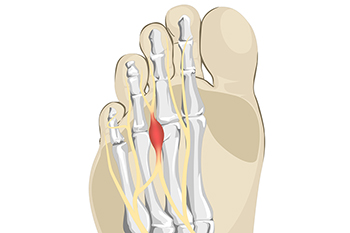
Morton's neuroma is a painful foot condition, where a nerve between the toes becomes thickened and inflamed. Morton’s neuroma often causes a burning sensation, tingling, or a feeling of a lump in the ball of the foot. This condition is commonly triggered by wearing tight shoes or high heels or by repetitive stress on the foot. Initial treatment focuses on relieving pressure on the nerve by switching to wider, more supportive footwear and using orthotic inserts to distribute pressure more evenly. Taking anti-inflammatory medication can help manage pain and inflammation. For persistent cases, corticosteroid injections or exercises may be recommended to reduce symptoms. In severe situations, surgical options might be considered to remove the affected nerve. If you suspect you have Morton's neuroma or are struggling with persistent foot pain, it is suggested that you make an appointment with a podiatrist who can provide specialized treatment tailored to your needs.
Morton’s neuroma is a very uncomfortable condition to live with. If you think you have Morton’s neuroma, contact one of our podiatrists of Pennsylvania. Our doctors will attend to all of your foot care needs and answer any of your related questions.
Morton’s Neuroma
Morton's neuroma is a painful foot condition that commonly affects the areas between the second and third or third and fourth toe, although other areas of the foot are also susceptible. Morton’s neuroma is caused by an inflamed nerve in the foot that is being squeezed and aggravated by surrounding bones.
What Increases the Chances of Having Morton’s Neuroma?
- Ill-fitting high heels or shoes that add pressure to the toe or foot
- Jogging, running or any sport that involves constant impact to the foot
- Flat feet, bunions, and any other foot deformities
Morton’s neuroma is a very treatable condition. Orthotics and shoe inserts can often be used to alleviate the pain on the forefront of the feet. In more severe cases, corticosteroids can also be prescribed. In order to figure out the best treatment for your neuroma, it’s recommended to seek the care of a podiatrist who can diagnose your condition and provide different treatment options.
If you have any questions, please feel free to contact one of our offices located in Plymouth Meeting and Ambler, PA . We offer the newest diagnostic and treatment technologies for all your foot care needs.
